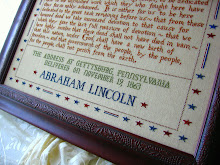We Celebrate Labor Day!
Today's story is told in pictures. Please click on the photos for a close-up view. Your encouraging comments over these last months continue to inspire, going forward into the next chapter of this sampler's life. I very much appreciate your taking the time to visit!
At times friends asked whether I tired of the project. Apart from a bit of physical fatigue (eye strain, finger cramps), I never tired of Lincoln's message. As stitchers, you are well acquainted with the amount of time involved in stitching even a small piece. With each stitch, the prose slowly appears on the linen, letter by letter -- that gives us time to meditate on each word. The Address unfolded in slow motion, allowing the stitcher time to absorb the depth of Lincoln's message. The Gettysburg Address is a national treasure. Thank you for joining me today.
"272 Words" -- The Gettysburg Address

"Four score and seven years ago, our fathers brought forth on this continent a new nation . . ."

". . . conceived in Liberty and dedicated to the proposition that all men are created equal."

"Now we are engaged in a great civil war, testing whether that nation or any nation so conceived and so dedicated can long endure. We are met on a great battle-field of that war. We have come to dedicate a portion of that field, as a final resting place for those who here gave their lives that that nation might live."

"It is altogether fitting and proper that we should do this."

"But, in a larger sense, we can not dedicate -- we can not consecrate -- we can not hallow -- this ground. The brave men, living and dead, who struggled here, have consecrated it, far above our poor power to add or detract."

"The world will little note, nor long remember what we say here, but it can never forget what they did here. It is for us the living, rather, to be dedicated here to the unfinished work which they who fought here have thus far so nobly advanced. It is rather for us to be here dedicated to the great task remaining before us . . . "



















